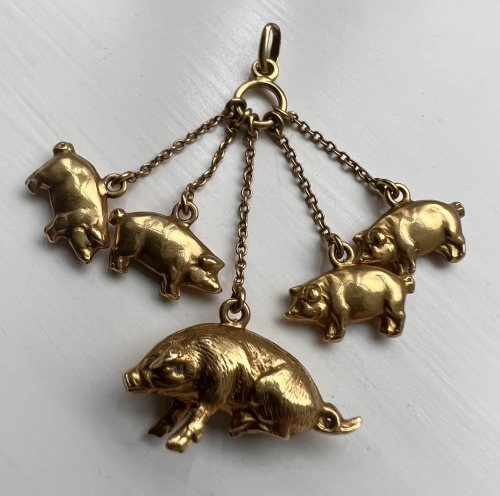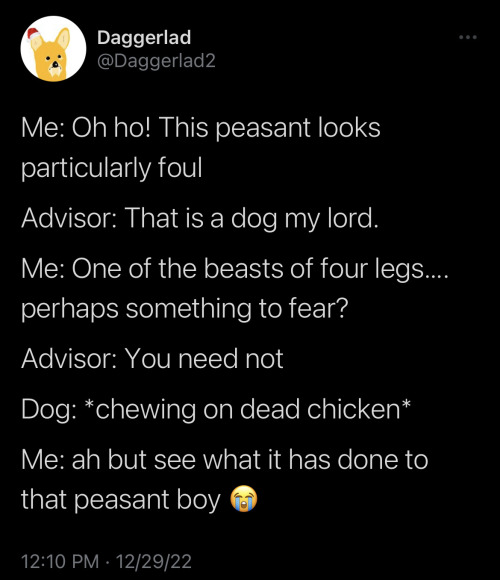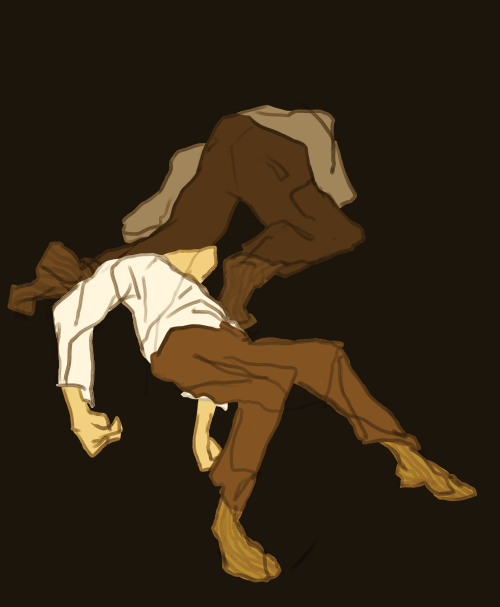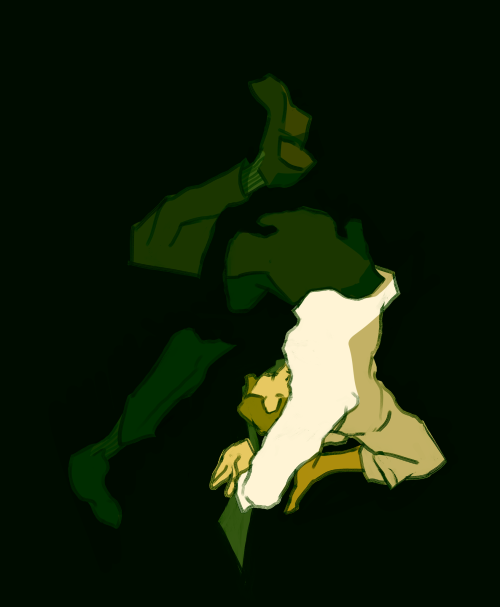enjoy this guy. hare who wears normal people scare me shirts. he’s literally just some bio major
18k GOLD VICTORIAN FAMILY OF PIGS PENDANT
“One of the most solid pieces of writing advice I know is in fact intended for dancers – you can find it in the choreographer Martha Graham’s biography. But it relaxes me in front of my laptop the same way I imagine it might induce a young dancer to breathe deeply and wiggle their fingers and toes. Graham writes: ‘There is a vitality, a life force, an energy, a quickening that is translated through you into action, and because there is only one of you in all of time, this expression is unique. And if you block it, it will never exist through any other medium and it will be lost. The world will not have it. It is not your business to determine how good it is nor how valuable nor how it compares with other expressions. It is your business to keep it yours clearly and directly, to keep the channel open.’”— Zadie Smith (via campaignagainstcliche)
This article is from 2022, but it came up in the context of Palestine:
Here are some striking passages, relevant to all colonial aftermaths but certainly also to the forms we see Zionist reaction taking at the moment:
Over the decade I lived in South Africa, I became fascinated by this white minority [i.e. the whole white population post-apartheid as a minority in the country], particularly its members who considered themselves progressive. They reminded me of my liberal peers in America, who had an apparently self-assured enthusiasm about the coming of a so-called majority-minority nation. As with white South Africans who had celebrated the end of apartheid, their enthusiasm often belied, just beneath the surface, a striking degree of fear, bewilderment, disillusionment, and dread.
[…]
Yet these progressives’ response to the end of apartheid was ambivalent. Contemplating South Africa after apartheid, an Economist correspondent observed that “the lives of many whites exude sadness.” The phenomenon perplexed him. In so many ways, white life remained more or less untouched, or had even improved. Despite apartheid’s horrors—and the regime’s violence against those who worked to dismantle it—the ANC encouraged an attitude of forgiveness. It left statues of Afrikaner heroes standing and helped institute the Truth and Reconciliation Commission, which granted amnesty to some perpetrators of apartheid-era political crimes.
But as time wore on, even wealthy white South Africans began to radiate a degree of fear and frustration that did not match any simple economic analysis of their situation. A startling number of formerly anti-apartheid white people began to voice bitter criticisms of post-apartheid society. An Afrikaner poet who did prison time under apartheid for aiding the Black-liberation cause wrote an essay denouncing the new Black-led country as “a sewer of betrayed expectations and thievery, fear and unbridled greed.”
What accounted for this disillusionment? Many white South Africans told me that Black forgiveness felt like a slap on the face. By not acting toward you as you acted toward us, we’re showing you up, white South Africans seemed to hear. You’ll owe us a debt of gratitude forever.
The article goes on to discuss:
- “Mau Mau anxiety,” or the fear among whites of violent repercussions, and how this shows up in reported vs confirmed crime stats - possibly to the point of false memories of home invasion
- A sense of irrelevance and alienation among this white population, leading to another anxiety: “do we still belong here?”
- The sublimation of this anxiety into self-identification as a marginalized minority group, featuring such incredible statements as “I wanted to fight for Afrikaners, but I came to think of myself as a ‘liberal internationalist,’ not a white racist…I found such inspiration from the struggles of the Catalonians and the Basques. Even Tibet” and “[Martin Luther] King [Jr.] also fought for a people without much political representation … That’s why I consider him one of my most important forebears and heroes,” from a self-declared liberal environmentalist who also thinks Afrikaaners should take back government control because they are "naturally good” at governance
- Some discussion of the dynamics underlying these reactions, particularly the fact that “admitting past sins seem[ed] to become harder even as they receded into history,” and US parallels
And finally, in closing:
The Afrikaner journalist Rian Malan, who opposed apartheid, has written that, by most measures, its aftermath went better than almost any white person could have imagined. But, as with most white progressives, his experience of post-1994 South Africa has been complicated. […]
He just couldn’t forgive Black people for forgiving him. Paradoxically, being left undisturbed served as an ever-present reminder of his guilt, of how wrongly he had treated his maid and other Black people under apartheid. “The Bible was right about a thing or two,” he wrote. “It is infinitely worse to receive than to give, especially if … the gift is mercy.”
Sylvanian families truffle wild boar family - father “Eustace Barrington” c. 2003
Alternative clothing and motorcycle provided by Unknown, likely the original poster.
freak by circumstance
would you look at beautiful pictures of the trilobite beetle with me






![Two tweets. The first, by Ghada Sasa PhD @sasa_ghada, reads: "When Israelis tell me they support [Palestinian flag emoji] but fear our liberation, I ask them why? Do you fear that when we are equal, we will unleash the same horrors on you that you callously inflicted on us? Are you racist/Islamophobic & are petrified of your imagined Arab/Muslim barbarian?" The second, replying to Dr. Sasa, is from hovsepig @DeovHov. It reads, "Some white South Africans resent the fact that black South Africans forgave them" and links to the article linked in this post.](http://web.archive.org./web/20240106045830im_/https://64.media.tumblr.com/b7ffd4770ecd98f650919c855c693c0e/d79a99c9baa576ac-ef/s1280x1920/5cbdf5c184e2728b0b63a41cdc47d56e1ec1201b.png)







